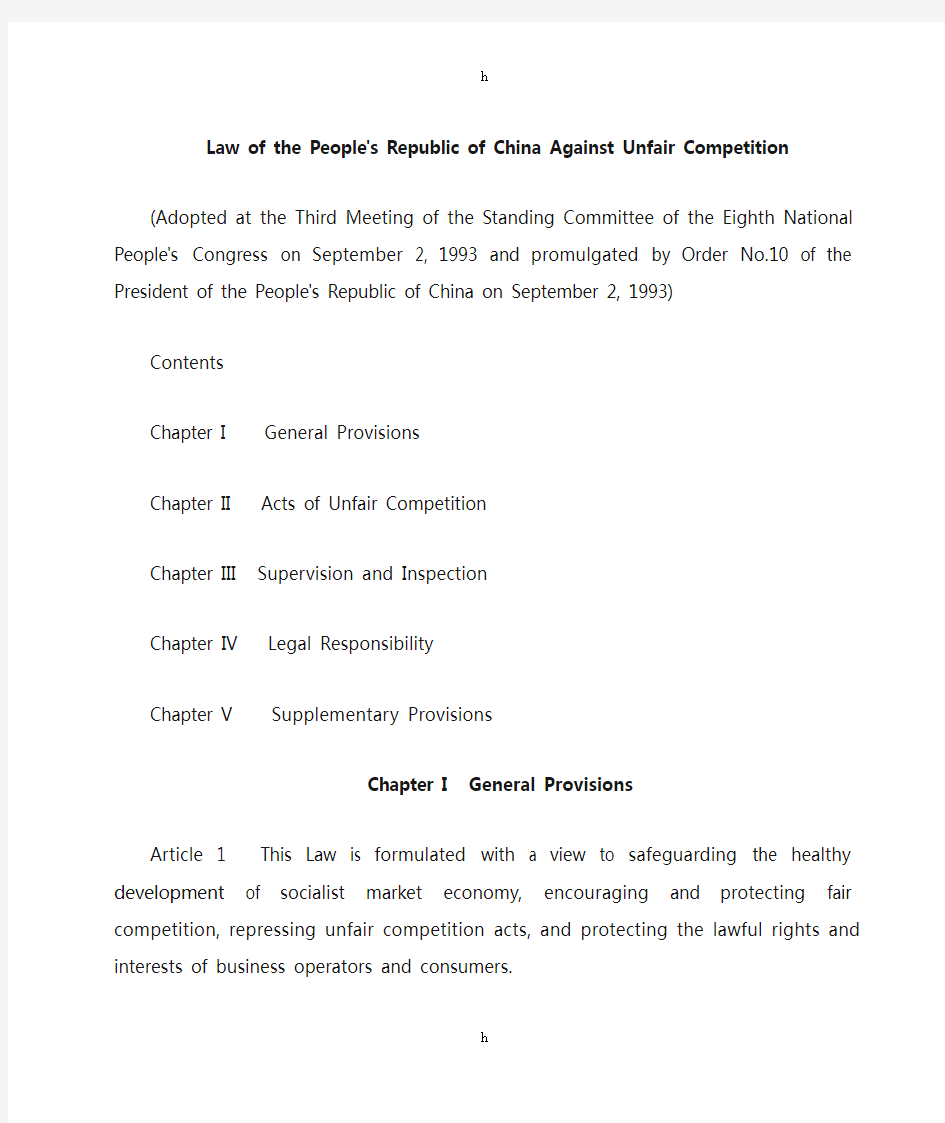《反不正当竞争法》word版

- 1、下载文档前请自行甄别文档内容的完整性,平台不提供额外的编辑、内容补充、找答案等附加服务。
- 2、"仅部分预览"的文档,不可在线预览部分如存在完整性等问题,可反馈申请退款(可完整预览的文档不适用该条件!)。
- 3、如文档侵犯您的权益,请联系客服反馈,我们会尽快为您处理(人工客服工作时间:9:00-18:30)。
Law of the People's Republic of China Against Unfair Competition
(Adopted at the Third Meeting of the Standing Committee of the Eighth National People's Congress on September 2, 1993 and promulgated by Order No.10 of the President of the People's Republic of China on September 2, 1993)
Contents
Chapter I General Provisions
Chapter II Acts of Unfair Competition
Chapter III Supervision and Inspection
Chapter IV Legal Responsibility
Chapter V Supplementary Provisions
Chapter I General Provisions
Article 1 This Law is formulated with a view to safeguarding the healthy development of socialist market economy, encouraging and protecting fair competition, repressing unfair competition acts, and protecting the lawful rights and interests of business operators and consumers.
Article 2 A business operator shall, in his market transactions, follow the principles of voluntariness, equality, fairness, honesty and credibility and observe the generally recognized business ethics.
"Unfair competition" mentioned in this Law refers to a business operator's acts violating the provisions of this Law, infringing upon the lawful rights and interests of another business operator and disturbing the socio-economic order.
"A business operator" mentioned in this Law refers to a legal person or any other economic organization or individual engaged in commodities marketing or profit-making services ("commodities" referred to hereinafter includes such services).
Article 3 People's governments at various levels shall take measures to repress unfair competition acts and create favourable environment and conditions for fair competition.
Administrative departments for industry and commerce of the people's governments at or above the county level shall exercise supervision over and inspection of unfair competition acts; where laws or administrative rules and regulations provide that other departments shall exercise the supervision and inspection, those provisions shall apply.
Article 4 The State shall encourage, support and protect all organizations and individuals in the exercise of social supervision over unfair competition acts.
No State functionary may support or cover up unfair competition acts.
Chapter II Acts of Unfair Competition
Article 5 A business operator shall not harm his competitors in market transactions by resorting to any of the following unfair means:
(1) counterfeiting a registered trademark of another person;
(2) using for a commodity without authorization a unique name, package, or decoration of another's famous commodity, or using a name, package or decoration similar to that of another's famous commodity, thereby confusing the commodity with that famous commodity and leading the purchasers to mistake the former for the latter;
(3) using without authorization the name of another enterprise or person, thereby leading people to mistake their commodities for those of the said enterprise or person; or
(4) forging or counterfeiting authentication marks, famous-and-excellent-product marks or other product quality marks on their commodities, forging the origin of their products or making false and misleading indications as to the quality of their commodities.
Article 6 A public utility enterprise or any other business operator occupying monopoly status according to law shall not restrict people to purchasing commodities from the business operators designated by him, thereby precluding other business operators from fair competition.
Article 7 Governments and their subordinate departments shall not abuse administrative powers to restrict people to purchasing commodities from the business operators designated by them and impose limitations on the rightful operation activities of other business operators.
Governments and their subordinate departments shall not abuse administrative powers to restrict commodities originated in other places from entering the local markets or the local commodities from flowing into markets of other places.
Article 8 A business operator shall not resort to bribery, by offering money or goods or by any other means, in selling or purchasing commodities. A business operator who offers off-the-book rebate in secret to the other party, a unit or an individual, shall be deemed and punished as offering bribes; and any unit or individual that accepts off-the-book rebate in secret shall be deemed and punished as taking bribes.
A business operator may, in selling or purchasing commodities, expressly allow a discount to the other party and pay a commission to the middleman. The business operator who gives discount to the other party and pays commission to the middleman must truthfully enter them in the account. The business operator who accepts the discount or the commission must also truthfully enter it in the account.
Article 9 A business operator may not, by advertisement or any other means, make false or misleading publicity of their commodities as to their quality, ingredients, functions, usage, producers, duration of validity or origin.
An advertisement agent may not act as agent for, or design, produce or release, a false advertisement while he clearly knows or ought to know its falsehood.
Article 10 A business operator shall not use any of the following means to infringe upon trade secrets:
